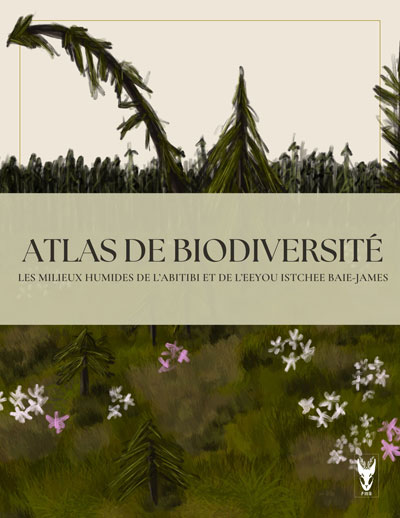
Tanya Handa
Chercheure régulière
Conséquences des changements globaux sur les processus écosystémiques
Département des sciences biologiques
Université du Québec à Montréal
Case postale 8888, succursale Centre-ville
Montréal (Québec) Canada H3C 3P8
Tel.: (514) 987-3000, poste 1644
Tel. laboratoire: poste 8416
FORMATION
- Stage post-doctoral au Centre d’écologie fonctionnelle et évolutive (CEFE-CNRS) à Montpellier (France), 2007-2010
- Ph.D. en écologie végétale, 2006 (Université de Bâle (Suisse))
- M.Sc. en botanique, 1998 (Université de Toronto)
- B.Sc. en biologie, 1996 (Université McGill)
PRÉSENTATION
Le Dr. Tanya Handa est devenue professeure à l’Université du Québec à Montréal en août 2010. Ses intérêts de recherches regroupent un désir de comprendre les conséquences des changements globaux pour les processus écosystémiques. Elle est intéressée par les effets de changements comme l’augmentation du CO2 atmosphérique ou l’urbanisation sur la croissance des arbres. Elle cherche également à comprendre comment les changements dans la biodiversité peuvent influencer la décomposition de litière et le recyclage de nutriments dans les écosystèmes forestiers.
Elle est la responsable scientifique de CRITTER (Dépôt de données de traits des invertébrés du Canada), un groupe de travail du Réseau canadien de traits
THÈMES DE RECHERCHE
1- La diversité et la décomposition dans l’écosystème forestier
Avec une augmentation dans les pertes de biodiversité causées par les activités anthropiques, une priorité émergente pour la science et la société est de comprendre comment les changements dans la composition des communautés influenceront le fonctionnement des écosystèmes. Nous étudions le processus de décomposition et le recyclage de nutriments pour comprendre quel est le rôle de la diversité des arbres et des détritivores dans la forêt tempérée, boréale et tropicale. Notre but est de co-développer et tester la théorie sur la diversité et les interactions trophiques en utilisant un modèle expérimental avec le détritus-détritivore et prédateur.
2- L’arbre en milieu urbain et péri-urbain
Les arbres fournissent plusieurs services écosystémiques importants à la société urbaine à travers leur valeur esthétique, une meilleure régulation de la température, de l’habitat disponible à plusieurs organismes, en améliorant l’écoulement de l’eau et la qualité de l’air, en fixant le carbone etc. Cependant, un des défis du milieu urbain pour les arbres est l’infrastructure associée à la distribution de l’électricité et la sécurité du public et celle des entrepreneurs qui assurent l’entretien. En collaboration avec la Chaire industrielle CRNSG-Hydro-Québec sur les contrôles de la croissance des arbres confiée au Prof. Christian Messier, nous sommes intéressés de comprendre le rôle des réserves de carbone dans la croissance et la survie des arbres en milieu urbain. Le but est de comprendre la dynamique des réserves quand les arbres sont taillés pour suggérer une technique d’élagage qui optimise les services écosystémiques tout en réduisant les coûts économiques.
3- Les effets de l’augmentation du CO2 atmosphérique et le réchauffement à la limite supérieure de l’arbre
Parmi les changements globaux, l’augmentation de la concentration atmosphérique du CO2 et le réchauffement climatique sont deux facteurs qui peuvent modifier le fonctionnement des écosystèmes. Dans un projet initié il y a dix ans à la limite supérieure de l’arbre dans les Alpes suisses, nous étudions la réponse des arbres et de l’écosystème suite à des manipulations expérimentales d’augmentation de CO2 atmosphérique et de réchauffement. Au delà de la croissance des arbres que nous avons suivi depuis 9 ans, nous étudions les effets de ces manipulations sur la décomposition de la litière et sur la production de métabolites secondaires dans l’arbuste nain, Empetrum hermaphroditum.
CHRONIQUEUSE SCIENTIFIQUE POUR L'ÉMISSION MOTEUR DE RECHERCHE À RADIO-CANADA
- audio fil du 25 janvier 2022 : Les arbres font-ils de la photosynthèse en hiver?

- audio fil du 11 novembre 2021 : Peut-on digérer les tardigrades?

Vous pouvez télécharger toutes mes références bibliographiques en format BibTeX, BibTeX-CSV, FRQNT ou EndNote
PUBLICATIONS
Livres
Aucun
Chapitres de livre
- Messier, C., Carpentier, S, Angers, V.-A., Tittler, R., St-Denis, A., Handa, I.T., Filotas, E., Paquette, A. (2015) La véritable valeur des arbres et bois urbains et péri-urbains. In L’économie de la biodiversité et des services produits par les écosystèmes: Un regard sur les concepts, outils et sur l’état de l’avancement de la recherche au Québec. (Revéret J-P and Dupras J, Eds.) Presses de l’Université du Québec
- Handa, I.T., Jefferies, R.L. (2009) Interactions between lesser snow geese and Arctic coastal vegetation leading to alternative stable states. (Chap. 15) In New Models for Ecosystem Dynamics and Restoration. (Hobbs, R.J. and Suding, K.N., Eds.) Island Press, pages 221-235
Livres, numéros spéciaux et actes de colloques publiés à titre d'éditeur
Aucun
Articles révisés par un comité de lecture
- Schnabel, F., Guillemot, J., Barry, K.E., Brunn, M., Cesarz, S., Eisenhauer, N., Gebauer, T., Guerrero-Ramirez, N.R., Handa, I.T., Madsen, C. et al. (2025) Tree Diversity Increases Carbon Stocks and Fluxes Above—But Not Belowground in a Tropical Forest Experiment. Global Change Biology, 31(2):e70089
- Aubin, I., Deschenes, E., Santala, K.R., Emilson, E.J., Schoonmaker, A.L., McIntosh, A.C., Bourgeois, B., Cardou, F., Dupuch, A., Handa, I.T. et al. (2024) Restoring forest ecosystem services through trait-based ecology. Environmental Reviews, 32(4):498-524
- St-Denis, A., Maure, F., Belbahar, R., Delagrange, S., Handa, I.T., Kneeshaw, D.D., Paquette, A., Nicol, M., Meurs, M.-J., Messier, C. (2024) An Urban Forest Diversification Software to Improve Resilience to Global Change. Arboriculture and Urban Forestry, 50(1):76 – 91
- Potapov, A.M., Chen, T.-W., Striuchkova, A.V., Alatalo, J.M., Alexandre, D., Arbea, J., Ashton, T., Ashwood, F., Babenko, A.B., Bandyopadhyaya, I. et al. (2024) Global fine-resolution data on springtail abundance and community structure. Scientific Data, 11(1)
- Jaeger, F.C., Handa, I.T., Paquette, A., Parker, W.C., Messier, C. (2024) Young temperate tree species show different fine root acclimation capacity to growing season water availability. Plant and Soil, 496(1-2):485 – 504
- Ramirez, J.A., Craven, D., Herrera, D., Posada, J.M., Reu, B., Sierra, C.A., Hoch,, Handa, I.T., Messier, C. (2024) Non-structural carbohydrate concentrations in tree organs vary across biomes and leaf habits, but are independent of the fast-slow plant economic spectrum. Frontiers in Plant Science, 15
- Meyer, J., Handa, I.T., Fabianek, F., Kneeshaw, D.D. (2024) Invasion by common reed in peri-urban wetlands does not affect insectivorous bat activity, despite a negative effect on prey abundance. Global Ecology and Conservation, 52:e02939
- Roberge, G., Handa, I.T., Juette, T., Kneeshaw, D.D. (2024) Invasive Glossy Buckthorn (Frangula alnus) Has Weak Impact on Native Understory Plant and Saprophagous Macroarthropod Communities. Diversity, 16(9):584
- Zhou, S., Butenschoen, O., Handa, I.T., Berg, M.P., McKie, B., Huang, C., Hattenschwiler, S., Scheu, S. (2024) Litter mixture effects on nitrogen dynamics during decomposition predominantly vary among biomes but little with litter identity, diversity and soil fauna. Soil Biology and Biochemistry, 199
- Marchand, T., Lecerf, A., Brousseau, P.-M., Chauvat, M., Danger, M., Forey, E., Handa, I.T., Hedde, M., Maunoury-Danger, F., Santonja, M. et al. (2024) The Detri2match conceptual framework: Matching detritivore and detritus traits to unravel consumption rules in a context of decomposition. Functional Ecology, 38(10):2084 – 2098
- Fehr, V., Moretti, M., Pezzatti, G.B., Guidotti, G., Rasmann, S., Handa, I.T., Buitenwerf, R., Svenning, J.-C. (2024) Non-native palm affects arthropod communities and litter decomposition in an ongoing biome shift. Global Ecology and Conservation, 56
- Dansereau-Macias, E., Despland, E., Handa, I.T. (2023) Decreased Soil Microbial Biomass and Changed Microbial Community Composition following a Defoliation Event by the Forest Tent Caterpillar. Forests, 14(4):792
- Gagnon Koudji, E., Despland, E., Caron, A.-S., Handa, I.T. (2023) Soil Springtail Communities Are Resilient to Forest Tent Caterpillar Defoliation in Quebec Mixed Hardwood Forests. Forests, 14(7)
- Caron, A.-S., Koudji, E.G., Handa, I.T., Montoro Girona, M., Despland, E. (2023) Forest Tent Caterpillar Outbreaks Drive Change in Ant Communities in Boreal Forests. Forests, 14(6):1147
- Raymond-Leonard, L.J., Cortet, J., Handa, I.T. (2023) Towards a standardization of new functional trait measurements by assessing intraspecific variation: the case of springtail mandibles. European Journal of Soil Biology, 117
- Ibarra-Isassi, J., Handa, I.T., Lessard, J.-P. (2023) Community-wide trait adaptation, but not plasticity, explains ant community structure in extreme environments. Functional Ecology, 37(1):139 – 149
- Martin-Guay, M.-O., Belluau, M., Cote, B., Handa, I.T., Jewell, M.D., Khlifa, R., Munson, A.D., Rivest, M., Whalen, J.K., Rivest, D. (2022) Tree identity and diversity directly affect soil moisture and temperature but not soil carbon ten years after planting. Ecology and Evolution, 12(1):e8509
- Santala, K., Cardou, F., Yemshanov, D., Campioni, F., Simpson, M., Handa, I.T., Ryser, P., Aubin, I. (2022) Finding the perfect mix: An applied model that integrates multiple ecosystem functions when designing restoration programs. Ecological Engineering, 180
- Kotze, D.J, Lowe, E.C., MacIvor, J.S., Ossola, A., Norton, B.A., Hochuli, D.F., Mata, L., Moretti, M., Gagné, S.A., Handa, I.T. et al. (2022) Urban forest invertebrates: how they shape and respond to the urban environment. Urban Ecosystems
- Ibarra-Isassi, J., Handa, I.T., Arenas-Clavijo, A., Escobar-Ramírez, S., Armbrecht, I., Lessard, J.-P. (2021) Shade-growing practices lessen the impact of coffee plantations on multiple dimensions of ant diversity. Journal of Applied Ecology, 58(5):919-930
- Ramirez, J.A., Vitali, V., Martínez-Vilalta, J., Handa, I.T., Messier, C. (2021) Reserve Accumulation Is Prioritized Over Growth Following Single or Combined Injuries in Three Common North American Urban Tree Species. Frontiers in Plant Science, 12
- Laigle, I., Moretti, M., Rousseau, L., Gravel, D., Venier, L., Handa, I.T., Messier, C., Morris, D., Hazlett, P., Fleming, R. et al. (2021) Direct and Indirect Effects of Forest Anthropogenic Disturbance on Above and Below Ground Communities and Litter Decomposition. Ecosystems, 24(7):1716-1737
- Malaterre, C., Dussault, A.C., Mermans, E., Barker, G., Beisner, B.E., Bouchard, F., Desjardins, E., Handa, I.T., Kembel, S.W., Lajoie, G. et al. (2021) Erratum: Functional diversity: An epistemic roadmap (BioScience DOI: 10.1093/biosci/biz089). BioScience, 71(9):996
- Brunet, N.D., Dagenais, D., Breux, S., Handa, I.T. (2020) A characterization of media representation of biodiversity and implications for public perceptions and environmental policy: the case of Québec, Canada. Environment, Development and Sustainability, 22(2):1655-1669
- Brousseau, P.-M., Giroux, M., Handa, I.T. (2020) First record on the biology of sarcophaga (Bulbostyla) (diptera, sarcophagidae). ZooKeys, 2020(909):59-66
- Raymond-Léonard, L.J., Bouchard, M., Handa, I.T. (2020) Dead wood provides habitat for springtails across a latitudinal gradient of forests in Quebec, Canada. Forest Ecology and Management, 472
- Zhou, S., Butenschoen, O., Barantal, S., Handa, I.T., Makkonen, M., Vos, V., Aerts, R., Berg, M.P., McKie, B., Van Ruijven, J. et al. (2020) Decomposition of leaf litter mixtures across biomes: The role of litter identity, diversity and soil fauna. Journal of Ecology, 108(6):2283-2297
- Rousseau, L., Venier, L., Aubin, I., Gendreau-Berthiaume, B., Moretti, M., Salmon, S., Handa, I.T. (2019) Woody biomass removal in harvested boreal forest leads to a partial functional homogenization of soil mesofaunal communities relative to unharvested forest. Soil Biology and Biochemistry, 133:129-136
- Raymond-Léonard, L.J., Gravel, D., Handa, I.T. (2019) A novel set of traits to describe Collembola mouthparts: taking a bite out of the broad chewing mandible classification. Soil Biology and Biochemistry, 138
- Malaterre, C., Dussault, A.C., Rousseau-Mermans, S., Barker, G., Beisner, B.E., Bouchard, F., Desjardins, E., Handa, I.T., Kembel, S.W., Lajoie, G. et al. (2019) Functional Diversity: An Epistemic Roadmap. BioScience, 69(10):800-811
- Brousseau, P.-M., Gravel, D., Handa, I.T. (2019) Traits of litter-dwelling forest arthropod predators and detritivores covary spatially with traits of their resources. Ecology, 100(10)
- Rousseau, L., Venier, L., Hazlett, P., Fleming, R., Morris, D., Handa, I.T. (2018) Forest floor mesofauna communities respond to a gradient of biomass removal and soil disturbance in a boreal jack pine (Pinus banksiana) stand of northeastern Ontario (Canada). Forest Ecology and Management, 407:155-165
- Ramirez, J.A., Handa, I.T., Posada, J.M., Delagrange, S., Messier, C. (2018) Carbohydrate dynamics in roots, stems, and branches after maintenance pruning in two common urban tree species of North America. Urban Forestry and Urban Greening, 30:24-31
- Brousseau, P.-M., Gravel, D., Handa, I.T. (2018) Trait matching and phylogeny as predictors of predator-prey interactions involving ground beetles. Functional Ecology, 32(1):192-202
- Raymond-Léonard, L.J., Gravel, D., Reich, P.B., Handa, I.T. (2018) Springtail community structure is influenced by functional traits but not biogeographic origin of leaf litter in soils of novel forest ecosystems. Proceedings of the Royal Society B-Biological Sciences, 285(1879)
- Brousseau, P.-M., Gravel, D., Handa, I.T. (2018) On the development of a predictive functional trait approach for studying terrestrial arthropods. Journal of Animal Ecology, 87(5):1209-1220
- Carpentier, S., Filotas, E., Handa, I.T., Messier, C. (2017) Trade-offs between timber production, carbon stocking and habitat quality when managing woodlots for multiple ecosystem services. Environmental Conservation, 44(1):14-23
- Craven, D., Thakur, M.P., Cameron, E.K., Frelich, L.E., Beausejour, R., Blair, R.B., Blossey, B., Burtis, J., Choi, A., Davalos, A. et al. (2017) The unseen invaders: introduced earthworms as drivers of change in plant communities in North American forests (a meta-analysis). Global Change Biology, 23(3):1065-1074
- Guerrero-Ramírez, N.R., Craven, D., Messier, C., Potvin, C., Turner, B.L., Handa, I.T. (2016) Root quality and decomposition environment, but not tree species richness, drive root decomposition in tropical forests. Plant and Soil, 404(1):125-139
- Garcia-Palacios, P., McKie, B.G., Handa, I.T., Frainer, A., H�ttenschwiler, S. (2016) The importance of litter traits and decomposers for litter decomposition: a comparison of aquatic and terrestrial ecosystems within and across biomes. Functional Ecology, 30(5):819-829
- Beausejour, R., Handa, I.T., Lechowicz, M.J., Gilbert, B., Vellend, M. (2015) Historical anthropogenic disturbances influence patterns of non-native earthworm and plant invasions in a temperate primary forest. Biological Invasions, 17(4):1267-1281
- Ramirez, J.A., Posada, J.M., Handa, I.T., Hoch, G., Vohland, M., Messier, C., Reu, B. (2015) Near-infrared spectroscopy (NIRS) predicts non-structural carbohydrate concentrations in different tissue types of a broad range of tree species. Methods in Ecology and Evolution, 6(9):1018-1025
- Handa, I.T., Aerts, R., Berendse, F., Berg, M.P., Bruder, A., Butenschoen, O., Chauvet, E., Gessner, M.O., Jabiol, J., Makkonen, M. et al. (2014) Consequences of biodiversity loss for litter decomposition across biomes. Nature, 509(7499):218-221
- Brousseau, P.-M., Gravel, D., Handa, I.T. (2014) First Record In Canada of Onthophilus pluricostatus LeConte (Coleoptera: Histeridae) and a New Mention for the Rare Species Lordithon niger (Gravenhorst) (Coleoptera: Staphylinidae). Coleopterists Bulletin, 68(2):343-344
- Hagedorn, F., Hiltbrunner, D., Streit, K., Ekblad, A., Lindahl, B., Miltner, A., Frey, B., Handa, I.T., Hattenschwiler, S. (2013) Nine years of CO2 enrichment at the alpine treeline stimulates soil respiration but does not alter soil microbial communities. Soil Biology and Biochemistry, 57:390-400
- Dawes, M.A., Hagedorn, F., Handa, I.T., Streit, K., Ekblad, A., Rixen, C., Korner, C., Hattenschwiler, S. (2013) An alpine treeline in a carbon dioxide-rich world: Synthesis of a nine-year free-air carbon dioxide enrichment study. Oecologia, 171(3):623-637
- Makkonen, M., Berg, M.P., Handa, I.T., Hattenschwiler, S., van Ruijven, J., van Bodegom, P.M., Aerts, R. (2012) Highly consistent effects of plant litter identity and functional traits on decomposition across a latitudinal gradient. Ecology Letters, 15(9):1033-1041
- Hattenschwiler, S., Coq, S., Barantal, S., Handa, I.T. (2011) Leaf traits and decomposition in tropical rainforests: Revisiting some commonly held views and towards a new hypothesis. New Phytologist, 189(4):950-965
- Dawes, M.A., Hattenschwiler, S., Bebi, P., Hagedorn, F., Handa, I.T., Korner, C., Rixen, C. (2011) Species-specific tree growth responses to 9years of CO 2 enrichment at the alpine treeline. Journal of Ecology, 99(2):383-394
- Dawes, M.A., Hagedorn, F., Zumbrunn, T., Handa, I.T., Hattenschwiler, S., Wipf, S., Rixen, C. (2011) Growth and community responses of alpine dwarf shrubs to in situ CO 2 enrichment and soil warming. New Phytologist, 191(3):806-818
- Rouifed, S., Handa, I.T., David, J.-F., Hattenschwiler, S. (2010) The importance of biotic factors in predicting global change effects on decomposition of temperate forest leaf litter. Oecologia, 163(1):247-256
- de Oliveira, T., Hattenschwiler, S., Handa, I.T. (2010) Snail and millipede complementarity in decomposing Mediterranean forest leaf litter mixtures. Functional Ecology, 24(4):937-946
- David, J.-F., Handa, I.T. (2010) The ecology of saprophagous macroarthropods (millipedes, woodlice) in the context of global change. Biological Reviews, 85(4):881-895
- Handa, I.T., Hagedorn, F., Hattenschwiler, S. (2008) No stimulation in root production in response to 4 years of in situ CO 2 enrichment at the Swiss treeline. Functional Ecology, 22(2):348-358
- Hagedorn, F., van Hees, P.A.W., Handa, I.T., Hattenschwiler, S. (2008) Elevated atmospheric CO2 fuels leaching of old dissolved organic matter at the alpine treeline. Global Biogeochemical Cycles, 22(2)
- Handa, I.T., Korner, C., Hattenschwiler, S. (2006) Conifer stem growth at the altitudinal treeline in response to four years of CO2 enrichment. Global Change Biology, 12(12):2417-2430
- Handa, I.T., Korner, C., Hattenschwiler, S. (2005) A test of the treeline carbon limitation hypothesis by in situ CO 2 enrichment and defoliation. Ecology, 86(5):1288-1300
- Hattenschwiler, S., Handa, I.T., Egli, L., Asshoff, R., Ammann, W., Korner, C. (2002) Atmospheric CO2 enrichment of alpine treeline conifers. New Phytologist, 156(3):363-375
- Handa, I.T., Harmsen, R., Jefferies, R.L. (2002) Patterns of vegetation change and the recovery potential of degraded areas in a coastal marsh system of the hudson bay lowlands. Journal of Ecology, 90(1):86-99
- Handa, I.T., Jefferies, R.L. (2000) Assisted revegetation trials in degraded salt-marshes. Journal of Applied Ecology, 37(6):944-958
Articles publiés dans des actes de colloque (proceedings)
Aucun
Rapports scientifiques, manuels et autres
- Handa, I.T. (2011) Rapport au MDDEP pour signaler la présence d’une espèce menacée floristique au Québec. Technical report, Ministère du développement durable, de l'environnement et des parcs, Québec
Thèses, mémoires et essais
- Handa, I.T. (2008) Tree and ecosystem responses to four years of in situ CO2 enrichment at the Swiss treeline. Thèse de doctorat, University of Basel
- Handa, I.T. (1998) Revegetation trials in degraded coastal marshes of the Hudson Bay lowlands. Mémoire de maîtrise, University of Toronto
Thèses, mémoires et essais supervisés
- Jaeger, F. (2024) Rooting for resilience : unveiling absorptive fine root traits and fungal dynamics in young temperate trees under high and low growing season water availability. Thèse de doctorat, Université du Québec à Montréal
- Sepulveda-Mina, R. (2024) L'influence de la complexité de la forêt urbaine sur les communautés de la macrofaune du sol et les contributions de la nature associées. Mémoire de maîtrise, Université du Québec à Montréal
- Roberge, G. (2023) Le nerprun bourdaine (Frangula alnus Miller) : des impacts modérés sur la diversité floristique indigène et des macro-arthropodes saprophages. Mémoire de maîtrise, Université du Québec à Montréal
- Meyer, J. (2022) Absence d'un effet du roseau commun sur l'activité des chauves-souris insectivores, malgré son effet négatif sur l'abondance de leurs proies. Mémoire de maîtrise, Université du Québec à Montréal
- Rousseau, L. (2018) Réponses des communautés de mésofaune du sol forestier à la récolte intensive de la biomasse ligneuse dans des peuplements de pin gris du nord-est de l'Ontario. Thèse de doctorat, UQAM
- Ramirez, J. (2017) The functional role of carbohydrate reserves in the growth and survival of trees. Thèse de doctorat, Université du Québec à Montréal
- Raymond-Léonard, L.J. (2017) La diversité fonctionnelle à plusieurs niveaux trophiques : l'influence des espèces d'arbres exotiques sur les collemboles de la litière. Mémoire de maîtrise, UQAM
- Potvin, E. (2017) Le processus d'opérationnalisation du concept de service écologique : le cas du Québec. Mémoire de maîtrise, UQAM
- Brousseau, P.-M. (2016) Structure et diversité fonctionnelle des communautés d'arthropodes de la litière forestière. Thèse de doctorat, UQAM
- Carpentier, S. (2015) Services écologiques et aménagement forestier-vers une nouvelle approche en forêt privée du sud du Québec. Mémoire de maîtrise, Université du Québec à Montréal
- Archambault, C. (2015) Effet de la diversité spécifique et fonctionnelle des arbres sur la densité et profondeur d'enracinement. Mémoire de maîtrise, UQAM
- Beausejour, R. (2014) Influence des perturbations anthropiques historique sur les patrons d'invasion de plantes et de vers de terre non-indigènes dans une forêt primaire tempérée (Réserve naturelle Gault, Mont St-Hilaire). Mémoire de maîtrise, Université de Sherbrooke
- Guerrero, N. (2013) Influences of tropical tree diversity on tree root decomposition. Mémoire de maîtrise, UQAM
- de Oliveira, T. (2008) Interactions entre deux espèces de la macrofaune saprophage dans la décomposition des litières en forêt méditerranéenne. Mémoire de maîtrise, Université de Montpellier 2
- Rouifed, S. (2007) Effets des changements atmosphériques sur la qualité des litières forestières et conséquences pour la macrofaune saprophage. Mémoire de maîtrise, Université de Montpellier 2
- Jackson, B. (2007) The interactive role of leaf litter and detritivore diversity in Mediterranean forest decomposition dynamics. Mémoire de maîtrise, Université de Montpellier 2
Articles non révisés par un comité de lecture
Aucun
<< Marie Guittonny | MembresReguliers | Daniel Houle >>










